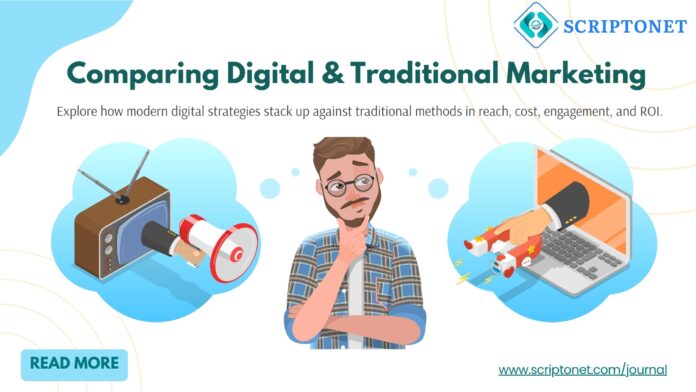Introduction to Marketing
Comparing digital marketing versus traditional marketing:The process of advertising, selling & distributing a good or service to consumers is known as marketing. Determining customer needs, creating strategies to satisfy them & cultivating enduring relationships with customers play a critical role in any firm. Customer engagement, brand awareness & business success all depend on marketing. Marketing is more than just advertising; it includes several tactics that support the success of companies. The following are the main justifications for marketing’s significance:
- Awareness of Brands
- Engagement with Customers & Revenue Generation
- An edge over competitors
- Market analysis.
One vital & dynamic function that affects corporate success is marketing. Effective marketing, whether done digitally or traditionally, enables companies to establish a relationship with their clients, foster consumer loyalty & experience sustained growth. Businesses can reach their full potential & differentiate themselves in a crowded market by putting into practice a well-thought-out & smart marketing plan.
What is digital marketing?
The process of leveraging online platforms & technologies to raise brand awareness, draw in new clients & turn them into devoted consumers is known as digital marketing. Among other things, it covers search engines, social media, email marketing, content marketing & paid advertising. Using digital channels, including search engines, social media, email, websites & online ads to promote goods & services is known as digital marketing. With its data-driven, cost-effective & highly targeted approaches to reaching consumers throughout the globe, it has completely transformed the marketing sector. Some of the key features of digital marketing are as follows:
Real-Time Analytics & Data: Monitor & assess performance in real-time.
Highly Targeted Advertising: Target particular groups according to their location, interests & behavior.
Two-Way Communication: Use chatbots, emails & social media to interact with clients directly.
Cost-effective & scalable: more affordable than traditional marketing, enabling competition for companies of all sizes.
Automation & AI Integration: Create individualized marketing campaigns using AI & machine learning.
Social Media Marketing (Facebook, Instagram, Twitter), Search Engine Optimization (SEO), Content Marketing (blogs, videos, e-books), Email Marketing, Pay-Per-Click (PPC) Advertising & Affiliate Marketing are just a few of the many online tactics that are included.
Through a variety of platforms, including digital advertisements, social media, email & websites, businesses can interact directly with their target audience through digital marketing.
Advantages Of Digital Marketing
The following are some advantages of digital marketing:
- Economic: Digital marketing has the potential to be both economical & successful.
- Global reach: Digital marketing may immediately establish connections with people anywhere in the world.
- Targeted advertising: This allows marketers to concentrate their efforts on particular groups of people.
- Measurable outcomes: Information on the effectiveness of campaigns can be obtained through digital marketing.
- Brand awareness: Increasing brand awareness & recognition can be facilitated by digital marketing.
- Improved consumer experience: Digital marketing may improve consumer interaction and satisfaction.
- Flexibility: Digital marketing can be adaptive & versatile.
Disadvantages Of Digital Marketing
- Negative feedback: Rude customers may post unfavorable remarks. This criticism has the potential to harm your reputation & influence the choices made by other clients.
- Customer Service: It might be tough to carry out excellent customer service online.
- Cybersecurity threats: Conducting business online has always come with hazards to safety & privacy. Users’ privacy is jeopardized & they become vulnerable to fraud due to excessive sharing of personal information & data theft.
- Over-Saturation: As digital advertising grows in popularity, consumers are inundated with advertisements, which can cause ad fatigue.
- Dependency on Technology & Technical Difficulties: The world of digital marketing is always changing. Tools such as Google Analytics, PPC, and SEO require prior training and direction. It can be difficult to compete internationally. Some consumers may find digital marketing prohibitively dependent on technology & internet connectivity.
- Learning Curve: Businesses require qualified specialists to implement digital marketing tactics successfully; thus, newbies face a high learning curve.
What is traditional marketing?
For many years, companies have used conventional marketing strategies to connect with their target consumer. Instead than using the Internet to promote goods and services, these techniques use offline networks. Traditional marketing is an efficient way to target local audiences and those who prefer face-to-face or actual contact. Traditional marketing refers to any type of advertising that reaches a target audience through offline media. Print advertisements, like those found in newspapers, are essential elements of conventional marketing. Offline marketing strategies include billboards, mailers, and radio and television ads. The tried-and-true, primarily offline strategies of advertising goods and services that have been in use for a long time are referred to as traditional marketing. Cold calling, billboards, direct mail, radio, television, print advertisements (in magazines, newspapers, and flyers), trade shows, and networking events are all examples of this.
Instead of focusing on direct interaction, traditional marketing tactics usually rely on large audiences & mass communication.
Advantages Of Traditional Marketing
- Memorable & Tangible: Billboards, brochures & print advertisements leave a lasting physical impression.
- Broad Audience: Newspapers, radio & television can all reach a large number of people.
- Built Trust: Conventional media sources are frequently seen as trustworthy & dependable.
- Good for Local Marketing: Assists in focusing on clients in a particular area.
- Reduced Digital Dependency: Perfect for audiences who don’t use the internet.
Disadvantages Of Traditional Marketing
- Higher Costs: When compared to internet marketing, TV, radio & print advertisements can be costly.
- Difficult to Measure: Monitoring a campaign’s efficacy might be difficult.
- Limited Interaction: Traditional marketing does not engage clients in a two-way fashion as digital marketing does.
- Slow Adjustments: It is expensive & time-consuming to make modifications to a print or television commercial once it has been released.
- Declining Reach: As more individuals turn to online platforms, conventional approaches can eventually lose their effectiveness
When Is It Better to Use Digital or Traditional Marketing?
Choosing between digital & traditional marketing depends on your target audience, budget & goals.
Digital marketing is ideal for businesses that:
- Wish to interact with younger, tech-savvy audiences may find digital marketing ideal.
- Have a tight budget & require affordable solutions.
- Measurable outcomes & prompt campaign modifications are required.
- Wish to establish enduring connections with clients by customizing their marketing initiatives.
Traditional marketing is great for businesses that:
- Need to reach a broader or more local audience.
- Need to build brand trust & credibility through physical materials.
- Work in sectors like luxury products, real estate or automobiles, where affluent clients could choose conventional techniques.
- Desire to increase brand awareness via billboards, radio or television.
Digital Marketing versus Traditional Marketing
| Sl. no. | Digital Marketing | Traditional Marketing |
| 1. | The mediums of digital marketing are websites, Social media, e-mail, search engines, etc. | The mediums of traditional marketing are TV, radio, billboards, etc. |
| 2. | More cost-effective with flexible budgeting | Higher costs for ads & production. |
| 3. | Audiences are highly targeted based on demographics, interests, & behaviors. | Broad & general audience. |
| 4. | Two-way engagement through likes, shares & comments. | One-way communication. |
| 5. | Real-time analytics & performance tracking. | Difficult to track Return on Investment (ROI). |
| 6. | Global reach with precise targeting. | Local & regional reach |
| 7. | Easy to adjust & optimize campaigns in real-time. | Harder to modify one published |
| 8. | Direct interaction & personalized marketing. | Limited customer interaction. |
Crucial Components of an Effective Marketing Plan
The following components are present in a successful marketing strategy are as follows:
- Knowing rivals, target audiences & market trends is known as market research.
- Identifying the target audience is the process of determining who the company wishes to reach.
- Value proposition by outlining the distinctive features of a good or service.
- Marketing Channels by selecting the most effective channels for business promotion.
Performance measurement is the use of analytics technologies to monitor & evaluate the efficacy of campaigns.
Conclusion
In summary, both digital & traditional marketing have their place. However, because digital marketing is online, it typically offers more flexibility, precise targeting, real-time data analysis & cost-effectiveness, making it perfect for connecting with today’s digitally connected audience. Traditional marketing, on the other hand, excels at reaching a large, offline audience through tangible mediums, establishing credibility & brand recognition, but frequently at a higher cost & with less precise targeting. Depending on their particular objectives & target market, most businesses find that utilizing both strategies maximizes reach & impact.
Frequently Asked Questions (FAQ)
What distinguishes digital marketing from traditional marketing?
Digital marketing reaches people through online platforms like websites, social media & email, whereas traditional marketing depends on offline techniques like TV, radio & print.
What kind of advertising is more economical?
Compared to traditional marketing, which frequently entails higher costs for print or TV commercials, digital marketing is typically more cost-effective since companies can target specific audiences & modify budgets.
Is it possible to combine digital & traditional marketing strategies?
Indeed, many companies combine the two (integrated marketing) to reach a variety of people & increase the effectiveness of their advertising.
How can I determine the efficiency of a digital marketing campaign?
Using indicators like website traffic, conversion rates, engagement levels, and return on investment (ROI), one can assess the efficiency of digital marketing. Google Analytics and social media insights are examples of additional measures.
Which digital marketing techniques are frequently used by small businesses?
To draw in & interact with their target audience, small businesses can utilize SEO, social media marketing, email campaigns, PPC advertising & content marketing.


